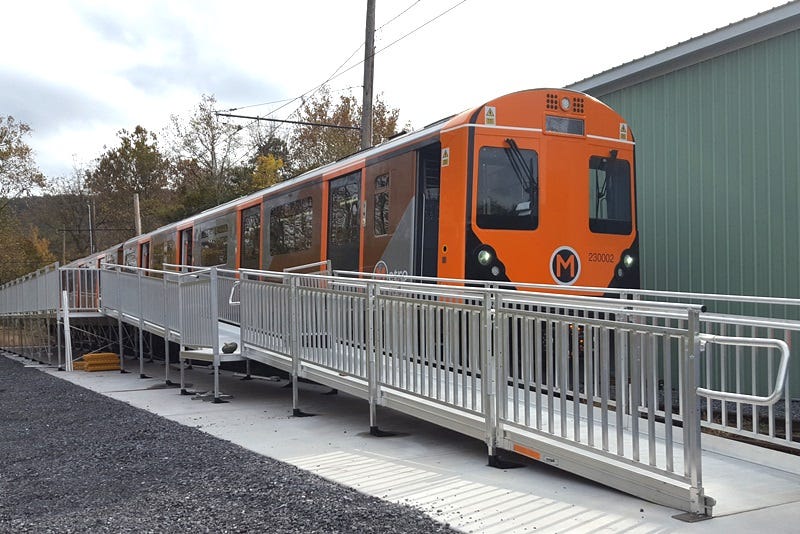Green trains at COP28 & the Infrastructure Bill
The "green" train that's running at COP26 might find another home here in western Massachusetts, and the Infrastructure Bill could help make it happen.
The friend who’s been doing the construction in my kitchen (oh, how that project has grown!) was telling me about his daughter’s experience at college. She’d been at school in Italy and is frustrated by the students here because they spend all their time on their phones, not talking to one another or doing things together.
There are all kinds of criticisms to level at social media platforms: the misinformation, the self-image issues, the narcissism. But what that young woman’s experience made me realize is that the big success of so-called “social” media is that it turns most people into consumers—compulsively reading the news instead of making it, watching videos of endangered animals instead of getting out in the world and doing something to change the future.
Maybe this is why my personal efforts as an environmentalist (in addition to publishing the Encyclopedia of Sustainability, of course!) are now focused on trains. I got tired of abstract arguments and endless agonizing over minor issues. Instead, I went for steel and stone ballast and Positive Train Control systems.
Of course I haven’t avoided the politicking. There’s plenty of it even with a relatively modest project like the restoration of the Berkshire Line to New York.
Like many environmentalists, I’ve been frustrated hat a crucial infrastructure bill has been held hostage by the Progressive Caucus, a group of Democrats. A compromise was agreed in the Senate - no small achievement - but the progressives in the House of Representatives refused to vote on it until they got approval of another, more controversial “social” spending bill.
Not only is that short-sighted, but it suggests that progressives think that infrastructure (that steel and stone ballast) is less worthy than than family leave and other social benefits. It denigrates the physical structures that make life better for all of us.
I’m in favor of other social spending, but want to see the country moving forward whenever we can. According to the headlines, today, Guy Fawkes Day 2021, may be the long-awaited Infrastructure Day. The House is said to be voting on the bill, with plans to send it to President Biden for signature. I’ll be relieved if no one tries to blow this up!
A train like the one I rode (and drove) last week in Pennsylvania is now running out of Glasgow Central during the COP26 Climate Summit. Read about it: “Pioneering 'green' train pulls in to Lanarkshire ahead of COP26 summit” and “Vivarail shows off battery train at COP26.”
My interest is in a battery-powered train service that will make Berkshire Line project I’ve been working on a national model for sustainable, 21st-century intercity/commuter service in a rural region. This would be a first step in the full restoration of service to New York City.

This innovative technology has been brought to the US by rail entrepreneur Henry Posner III of Pittsburgh. The idea of the US Pop-Up Metro is to provide a reliable, low-cost, and sustainable way to prove the market for passenger train service. The train I rode last week has battery range of 50-60 miles with an 8-10 minute charge at the end of each journey.
I can’t help wondering if I might have been on the same train in its previous incarnation on the London Underground, running on the District Line. When I worked for Valerie Eliot in Kensington, I would take the bus to Charing Cross and pick up the District Line. It would be astonishing to have the same train running a few blocks from my home in Great Barrington, but that’s what I am working on right now.
Indeed, the electrification of trains and train lines is a way to move from fossil fuels to renewable sources, but a very expensive proposition. In a country like the United States, where it’s hard to get money for public transit, electrification seems a pipe dream. I assumed that we would have to start with diesel trains because electrifying the Berkshire Line would cost, I was told, a minimum of $5 million per mile. This is what makes the Vivarail model so important: it makes it possible to put electric trains on short routes.
But electricity is only “green” if it is produced efficiently from renewable sources. Transmitting and storing electricity in batteries has extra costs and impact because of the materials needed, and waste involved. All these things merit review as we plan for the future, and electricity alone is not a solution to the climate crisis.
In fact, saying something is “electric” can be a kind of virtue signaling, like email signatures that urge recipients not to print in order to “save trees.” Trees, like whales and elephants, are what biologists call “charismatic megafauna,” whose size, age, and beauty often elicit a sense of reverence. Unfortunately, this often leads to neglect of smaller, less attractive, but essential life forms.
And we forget that most trees are a renewable resource. As I wrote ten years ago in an article about the publishing industry, “Our use of energy and water matter much more than wood pulp. In the eastern United States, mountaintop forests are often destroyed in order to get at coal to fuel power plants and generate the electricity that powers ebook readers. Ebooks might in some cases kill more trees than print books.”
By the way, the Train Campaign is a volunteer-run project of the Barrington Institute, a nonprofit I started in order to be able to take on projects even less commercial than most of my publishing. I also host a podcast called Train Time, with Transportation for Massachusetts as our first underwriter. For US taxpayers, donations are tax-deductible and we’ll of course welcome support from anyone, anywhere (Donorbox).
More on COP26 next week, along with a guide to identifying trees in trouble from one of our Encyclopedia of Sustainability authors, Karin Vaneker in the Netherlands.
Warm regards, Karen.









Regretable that you would put the steel and cement ahead of the well-being of people who have been grievously slighted by the system -- the'progressives' are not calling for either or -- they want and the US needs BOTH